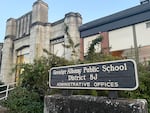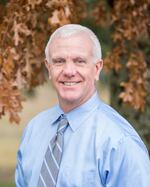Perhaps it shouldn’t be a surprise that the Greater Albany Public Schools governing board is finding a lot of disagreement over its “Studying Controversial Issues” policy.
This policy isn’t new. It was first adopted in 2001 and updated in 2022, but it’s now up for review. Greater Albany is not alone as school districts nationwide have been navigating growing political divisiveness. It’s not the only district facing budget issues or tensions in union negotiations as teachers work without a contract. Nor is Greater Albany the only district in the state with a policy governing controversial topics in classrooms. In fact, more than 130 districts across Oregon have some variation.
But what seems to set Greater Albany apart is that they’re grappling with these challenges after facing major changes and community criticism. In 2021, the board fired then-Superintendent Melissa Goff without clear cause, shortly after new members took over (Goff was recently named to run the state agency supervising educator licensure). Since then, GAPS has lost several district administrators for various reasons. A noted political shift in the school board — a nonpartisan body — has led some to describe the board as “ultra-conservative.” And the district recently lost a federal lawsuit on gender discrimination against a student.
The controversial issues policy seems to be the latest indication of split ideologies in the Mid-Willamette Valley community.

Greater Albany Public Schools board members convened a public meeting on Monday, Oct. 9, 2023, in Albany, Ore.
Natalie Pate / OPB
Under the district’s current policy, a teacher must speak with their principal about controversial issues they plan to discuss in class to determine whether it’s appropriate for the course and the students’ maturity level. They also need to discuss how they will approach the instruction and review any materials that will be used.
The policy defines a controversial issue as “any topic or problem which society is in the process of debating on which there is honest disagreement.”
According to the policy, the school board isn’t against controversial issues being discussed. Rather, they want to make sure the conversations at school teach students to develop balanced judgment, informed opinions and the ability to differentiate fact from opinion.
District officials could not find a count of how many times the policy has been used in the past 22 years.
The board listened to more than an hour of public comment during its Sept. 25 work session and received hundreds of responses to a recent survey about the policy. It’s not clear when a final decision will be made, but it’s likely to take several weeks.
Officials plan to hold small feedback groups in the near future, but there’s no set timeline or plan as of Tuesday. The next board meeting is scheduled for Oct. 23. District communications officials said it’s likely the Studying Controversial Issues policy won’t be discussed again until at least the Nov. 20 meeting.
Hundreds voice feedback
Nearly 670 parents, employees and other community members took the board’s survey on whether they feel Greater Albany’s policy is clear. The results were included in materials at this week’s school board meeting.
The majority of respondents were parents, and the results were fairly split. About 59% said they felt the “controversial issues” definition in the policy is clearly defined, while 41% said they do not.
Some parents argued controversial issues shouldn’t be discussed in schools at all. Others said it should be up to the parents and there should be an opt-in form, rather than one to opt-out.
“Anything falling under this definition or something a parent would say NO to WILL be avoided in school and is the responsibility of the parents to teach their child if they so wish,” one parent wrote in the survey comments.
Some argued the policy was too broad and could be manipulated. Others posed questions about who gets to decide what’s controversial or how they define “honest disagreement.”
And some felt the policy was representative of larger issues.
The late September board meeting took place on the same day the public learned a federal jury in Eugene found the district and a former Greater Albany elementary school principal violated the U.S. Constitution, Title IX and Oregon law by discriminating against a student for being nonbinary.
The Albany Democrat-Herald reported that the district was offered an approximately $80,000 settlement earlier in the case, with the condition that the school board adopt a transgender and gender-nonconforming nondiscrimination policy, similar to one adopted by the Corvallis School District. They refused to do so. A jury later awarded the student $317,353 in compensation as a result of the lawsuit.
Aside from that, individual board members have been critiqued by advocates for their views on equity.
“This definition is a cowardice attempt to hide behind vague words that really say, ‘Our district’s claim of inclusion is not meant for the LGBTQ community,’” one parent wrote in the survey comments.
“Should the teachers alert parents that they will be teaching about women’s suffrage? Some people in our community are misogynous,” the parent continued. “Should the teacher alert parents that they are teaching about the civil rights movement? Some people in our community are racist.
“Stop hiding behind this vague policy and stand for what is right,” they wrote. “Our children deserve it.”
Local pastor, GAPS parent and former educator Peter Epp spoke during public comment at the work session last month, saying educators are already aware they will be disciplined for pushing their personal opinions or biases onto students. He argued the policy shows a lack of trust in educators to do their jobs.
“When a lack of trust doesn’t match up with common knowledge or common sense, we don’t need procedures that heighten distrust or make interactions between families and schools feel more litigious,” he testified.
“We need our board and superintendents to do what our best teachers do — to help us talk to each other, to help us listen to each other, to help us relieve our schools of the ever-growing pile of suspicion-laced procedural requirements that wear our teachers thin and burn them out.”
Proposed changes
Superintendent Andy Gardner during the September work session pointed out that how schools teach controversial subjects is not a new debate. He cited the “Scopes Monkey Trial” of 1925, in which high school teacher John T. Scopes was accused of violating Tennessee’s Butler Act, which had made it illegal to teach human evolution in any state-funded school.
Controversial concerns raised in Albany and in other districts now may include sex education, LGBTQ or racial justice topics from conservatives, for example, or the presence of police in schools and the requirement to say the Pledge of Allegiance from liberals.
Gardner told OPB that part of the problem is there’s little awareness, districtwide, about the existing policy.
“Our intent is to create a fair process that staff are aware of and can follow to loop in our students’ families when controversial topics are addressed,” he said.
Gardner told board members Monday that while educators must teach to state standards, there may be instances where the policy could come in handy, such as if a teacher reads aloud an unapproved book or has a guest speaker who broaches a controversial topic.

Andy Gardner is the superintendent of Greater Albany Public Schools. This fall, the GAPS school board is considering renewing and revamping a policy that sets requirements on how schools teach "controversial issues."
Courtesy of Greater Albany Public Schools / OPB
A new proposed version of the policy adds some specificity, emphasizing that the district encourages “unbiased, unprejudiced and scientific study” of controversial issues as they arise. The basic goal, it states, is to enable students to develop techniques for considering questions they’re likely to face later in life.
Gardner said the latest draft is based on Beaverton School District’s version of the policy, which was adopted in 2008.
The Oregon School Boards Association provides policy services for a fee to many districts across the state. The latest count shows 139 districts the association works with have a version of the controversial issues policy. Officials with OSBA said districts can change the wording, so their policies aren’t necessarily the same as the statewide agency’s sample.
Greater Albany is still discussing further edits to theirs. The superintendent’s administrative regulations recommendations outline more logistics and procedures for parent/guardian notification and opt-out requests. It specifies a teacher must notify parents at least seven days in advance of the lesson.
Lingering questions
At Monday night’s meeting, Roger Nyquist was the only school board member to raise reservations about the policy.
“We have a process to approve curriculum, and it’s a public process. Any member of the public can participate in that. And teachers teach to the curriculum. Correct?” he asked the board and district officials. They confirmed.
Nyquist continued, “And I believe any parent of a child in this district has the right to have access to curriculums for any class, any subject, their child may be taking. Is that correct as well?” Someone answered that they should be available online.
“So,” he paused, “I guess I look forward to learning why that process that’s in place is deficient. It seems simpler than putting a burden, particularly on teachers, to give notice within a certain period of time and adding to what they do.”
Nyquist also pointed out that it’s not clear what happens to a teacher if they miss a required step. Further complicating the process, one teacher said it can take weeks just to get an appointment with a principal to have these conversations.
Nyquist later told OPB that his hope is to get past the fear and sensitivity around topics in the classroom. He worries this policy will make things worse.
But the school board is in a tricky position, he said, given the district has already had this policy in place for years.
“I do have concerns,” Nyquist said. “The term ‘controversial subjects’ is subjective. I do not know how we are going to do this in a way that meets everyone’s expectations.”
